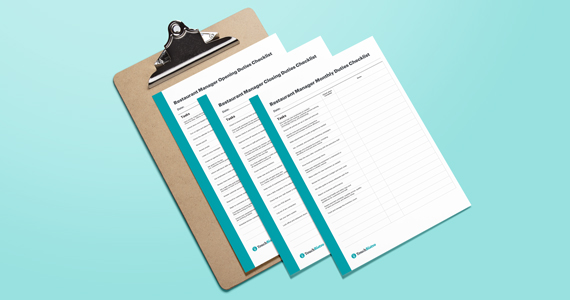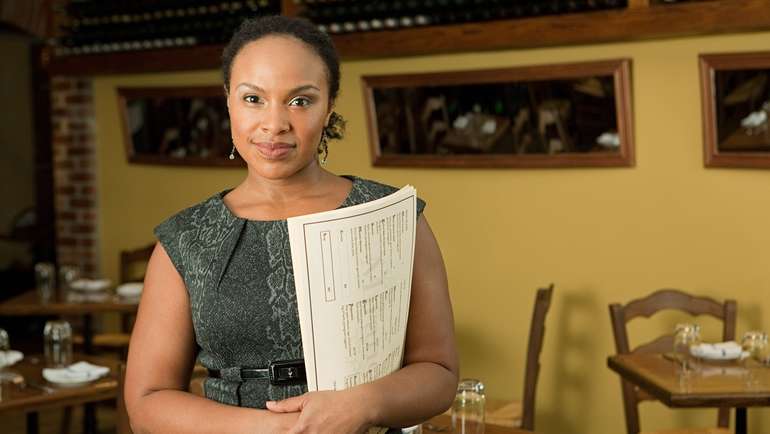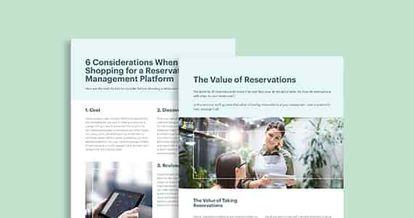If you’re running a restaurant, it may seem like your to-do list never ends. But, what if you could delegate some or most of your tasks to an authorized individual? That’s right! A restaurant manager acts as a mini-you. They manage and oversee all restaurant operations – even when you’re not physically present at your establishment.
Finding the best restaurant manager isn’t easy. In fact, it might take you several months. In this article, we’ll go over:
- What a restaurant manager is
- What your restaurant manager can do for you at your business
- Where to find your dream restaurant manager
- The characteristics you’ll want your restaurant manager to have
- The top interview tips for this role
Time to find your second-in-command!

Use these daily and monthly checklists to keep restaurant managers on track and operations running smoothly.
What Is a Restaurant Manager?
As your business grows, managing every aspect of operations alone gets harder – unless you’re able to clone yourself.
A restaurant manager is a professional in charge of overseeing, organizing, and coordinating all operations of food service establishments, so everything runs smoothly.
Since there are so many parts of a restaurant operation, you may want to consider having numerous managers that focus on certain areas. Some of these include:
- General Manager (GM): Your general manager (GM) is your eyes and ears on the ground. They help oversee the entire restaurant and assist in leading your other managers.
- Front of House Manager: This manager will report to the GM and oversee all your front of house employees. They assist with training, hiring, and customer issues that servers may not be able to deal with.
- Back of House Manager: This manager is the equivalent of the front of house manager for your kitchen team. They also report to the GM and their responsibilities include hiring new employees, ensuring food safety standards are upheld, and jumping in if the kitchen is busy.

What Can Your Manager Do For You?
So you know what a restaurant manager is, but what do they do at your business?
Your restaurant manager is great for taking some of the responsibilities off your plate, giving you time to focus on bigger business decisions or – gasp! – a day off.
A manager’s duties may differ depending on the business. Some of these duties can include:
- Organizing stock
- Managing inventory and food or drink orders
- Ordering food and drinks supplies
- Overseeing the team to ensure kitchen and dining areas are clean
- Checking the quality and size of servings
- Training new servers on dining etiquette
- Solving employee and customer problems
- Scheduling employees
Depending on the size of the restaurant, your restaurant manager may participate in food preparation, selecting recipes, and compiling menus. This task usually falls to the head chef, but in smaller restaurants, the position may be occupied by the same person. If that’s the case for your restaurant, your manager should have a strong background in food preparation and food service management.
Your restaurant manager will also be the face of customer service – they set a major example to your other staff members and will be the go-to person if an issue needs to be escalated beyond a front-of-house staff member. Your restaurant’s goal is to provide exceptional customer service so that diners return you want a manager you trust to do just that.
However, restaurant management positions are hard to fill.
Despite the increased competition for finding and retaining staff in the food service industry, there is still a shortage across people to fill in key jobs in the field. According to Restaurants Canada’s Restaurant Outlook Survey, one third of restaurant owners and operators are finding it challenging to fill in manager positions.
Why is that?
The restaurant industry has been facing a labor shortage for some time, meaning there are more jobs than people out of work. And as the industry continues to grow, so does the gap between roles filled and people to fill then.
Given these trends and statistics, you’ll want to hire the right person on the first go. So, what do you need to look for?

Use these daily and monthly checklists to keep restaurant managers on track and operations running smoothly.
What Characteristics to Look for in a Restaurant Manager
Since you’ll be handing over some of your daily restaurant duties to your manager, it’s important to choose someone with a strong skill set and a good amount of experience.
A manager’s duties aren’t just to oversee the operations of the restaurant and staff, but to motivate and uplift the restaurant. The best managers strive to maintain a good reputation and a good profit for your restaurant. What it takes is the right combination of qualities and skills that will leave a significant impact on your business for years to come.
So, what skills do you need to be looking for?
Here are some key hard and soft skills that all great restaurant managers should possess.
Soft Skills
Charismatic and Communicative
Communication is a two-way street. Your restaurant manager must be clear and consistent in their communication with both staff and patrons. As an effective communicator, the manager should know how to actively listen and provide constructive feedback. It’s important to recognize areas where your staff can improve, but also calling out their individual or team strengths.
The person should also be skilled at problem-solving and making his staff feel empowered. Setting clear and achievable expectations for your staff is key in diplomatic communication.
If you already encourage transparency in your business, look for the same quality in your restaurant manager. They should be open to receive questions, comments, and concerns from your staff at any time and make them feel valued.
Attentive and Problem Solver
Your manager should pay attention to every single detail with eagle eyes and ensure the smooth sailing of operations. Instead of lecturing or punishing staff, they should solve problems when deemed appropriate – and be comfortable offering feedback when necessary. For instance, if a diner’s water glass is empty and the server walks by without filling it up, the manager should step up and fill up the glass himself.
Attention to detail and quick reaction time are important skills that a good restaurant manager should have.
Forward-thinker
A good manager always thinks one step ahead of everyone else. Unexpected events happen quite often in the restaurant business, and you want somebody who can think of a solution before it even happens.
For instance, when guests are being unreasonable, your manager should be able to jump in with a solution and a way to prevent the issue from happening again in the future.
Compassionate
A good manager must be able to listen and help their staff with any work-related or personal experiences, as it might affect their professionalism. You want somebody who can jump into any conflicts at work and help solve them. Your staff should be able to trust your manager with their problems and respect their decision-making skills.
Look for someone who is strict, but not cold-hearted. A sense of empathy will go a long way with your team.

Hard Skills
Knowledge of Restaurant Operations
A college or university degree is not necessarily required for the managerial position, as experience is more valued in this field. But if you are operating a specialized restaurant, you may want to choose someone who has a degree in Hospitality Management or Business Studies under their belt.
Since experience is highly valued in the food services industry, restaurant managers are usually required to have a minimum of three to five years of management experience. They also need to have demonstrated the ability to lead a team. For example, you can ask them about a time they had to motivate a struggling staff member or how they managed a difficult conversation with a server to give you some insights on how they would lead.
Having someone with extensive knowledge of restaurant operations is also a bonus. You can’t compromise on experience!
Financial Proficiency
The manager will have a huge influence on your restaurant’s finances. From inventory to staffing, a lot of the areas they touch will directly impact your bottom line. They won’t be an accountant, but they should be able to show you they’ve made decisions that have positive impacts on the bottom line. A good restaurant POS and employee scheduling software can help your manager make better business decisions, so look for someone with experience using these systems.
Even with technology to help manage the operations, you’ll want to choose someone who knows a lot about the financial side of the restaurant industry.
Past Management Experiences
We’ve said it before – you don’t want to compromise on experience. Experience as a manager in the past or examples on their resume that built the skills somebody would need as a manager are key skills.
There are some specific areas you’ll want your future restaurant manager to have experience managing. If you’re hiring from within your own team, you’ll have to consider they won’t have all of these boxes checked – chances are, no hire will have experience in every single one of these areas managers could end up in charge of!
Here are some areas you’ll want a restaurant manager to show they have either hands-on experience or similar experiences that will give them the skills to tackle these responsibilities:
- Planning menus
- Assisting with inventory and ordering supplies
- Hiring, onboarding, and supervising staff
- Handling diners’
- Understand and prepare staffing or sales reports

Use these daily and monthly checklists to keep restaurant managers on track and operations running smoothly.
Where to Hunt for an Experienced Manager
But where do you find a person with all these skills?
When filling a role as important as a manager, it’s a little more difficult than a “Help Wanted” sign in the window. Prepare to be patient – it’s a big role and might take you a few months to fill.
Here are some other ways to go about hunting for a restaurant manager.
Hire Within Your Own Wonderful Team
Hiring internally invests in your employee’s future career and shows other team members there is the potential for growth at your business. Search your staff to find a trustworthy and high-potential manager among them.
Promoting from your own team ensures that you know someone’s worth ethics and perform well enough that you are willing to delegate more tasks to them. This eventually preserves loyalty among your staff.
Seek Candidates From the World Wide Web
The Internet has made this part convenient. The two giant job search engines, Monster and Indeed have made the application process fast and easy. All you need to do is put up a detailed ad for an experienced restaurant manager, and receive email resumes. This results in a large number of applicants that you can then look through and weed out the unqualified ones.
If you want to get specific, there’s even hiring websites that are specific to the restaurant industry! If you want to narrow down on the people seeing the listings, look at websites like Culinary Agents or Restaurant Careers. Keep in mind that unlike Monster or Indeed, some of these more specific websites require a fee to post your job listing.
From Your Network – Ask Around!
Did your cousin’s neighbor study hospitality management and have five years of management experience under his belt? Bingo!
Ask your close friends, relatives, and other professionals in your network if they know someone qualified enough to take on this position. It may not result in a huge pile of resumes, but it’s a great way to find quality and trustworthy applicants.
Tips on Choosing Your Dream Manager
You’ve received all the resumes from potential candidates. Now what?
You need to personally interview them. Prepare some questions for each one based on the information on their resume. Contact their former employers or find online reviews about those restaurants, their popularity and quality of service.
The right candidate should possess all or most of the skills mentioned above. But also pay attention to their personal qualities. The candidate might be a fantastic leader and great with numbers but may not be able to hold a conversation and smile at guests.
Nobody’s perfect. But at the same time, they need to show you that they have the potential to develop certain skills through time and training.
How to Effectively Conduct an Interview
Once you have your candidates lined up, it’s time to learn more about who they are and whether they’re fit for the managerial role at your restaurant.
Here are a few quick tips before you actually get down to the interview questions:
- Set up a positive, quiet environment. No need to dim the lights and light candles, but make sure you’re in a quiet place. No distractions!
- Offer them water or coffee (or any other cold/hot beverage – definitely not alcohol!)
- Welcome the applicant with a warm smile and invite them to sit. You can also make them feel comfortable by asking them how their commute was or if they had difficulty finding your restaurant
If the interview is going well, tell the applicant that you’re interested in them and that they’ll hear back from you once you’ve made a final decision. This establishes a positive and professional rapport and puts the applicant’s mind at ease.
When you’re ready to hire your manager, draft an employee restaurant contract. This is basically a legal document that outlines the terms of employment offered to your new restaurant manager, as well as a description of the employee-employer relationship.

Ultimately, finding your dream manager isn’t easy.
Keep in mind that your restaurant manager is basically a mini-you. They act as both the administrator and the head of personnel and run the show in your absence. You need someone who is capable of keeping things under control without you constantly looking over their shoulder. A great manager must be firm (but not heartless), understanding, attentive, and fair to all employees.
Before searching for one, balance out the above ideas and write down exactly what it is that you are trying to accomplish by hiring a restaurant manager. You can then rest assured that with a manager like that by your side, you’ll be right on your way to business success.

Use these daily and monthly checklists to keep restaurant managers on track and operations running smoothly.
Download your free employee handbook template
Sign up for our free weekly TouchBistro Newsletter







